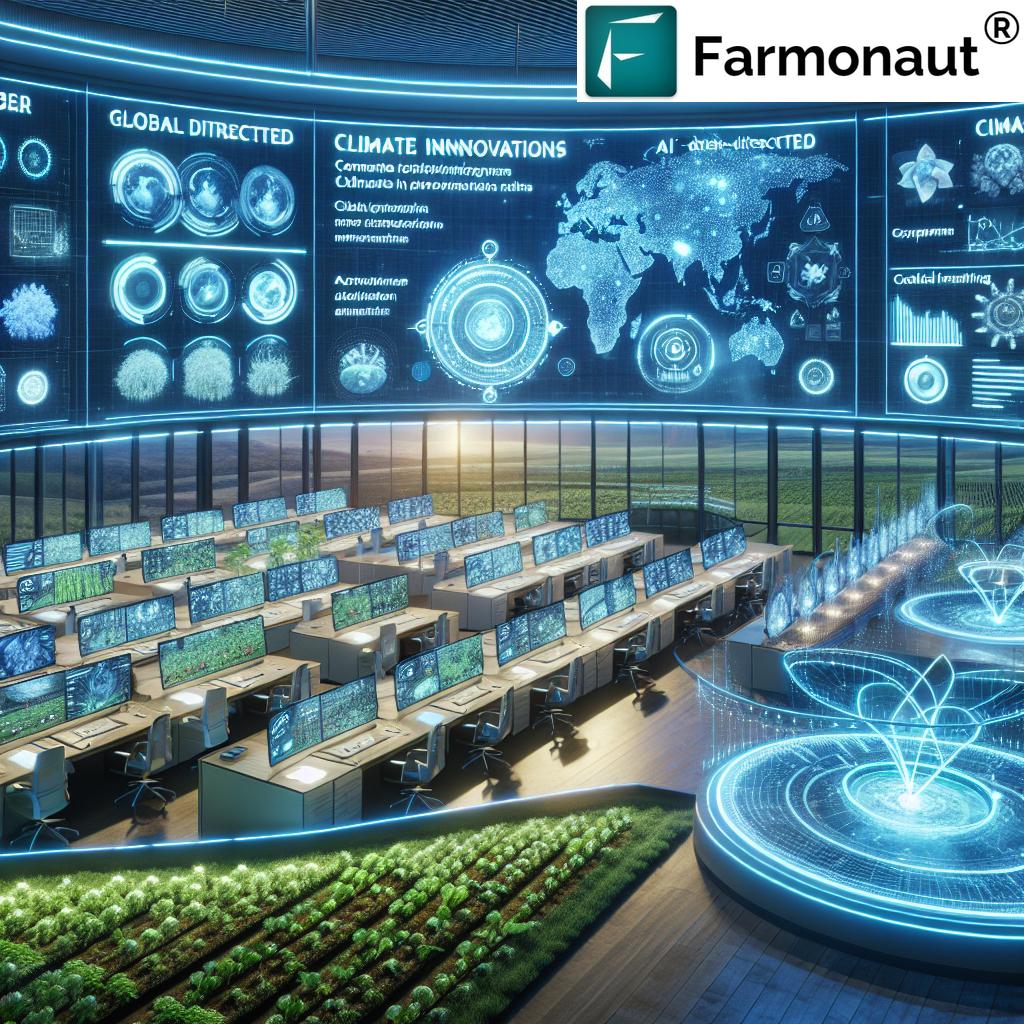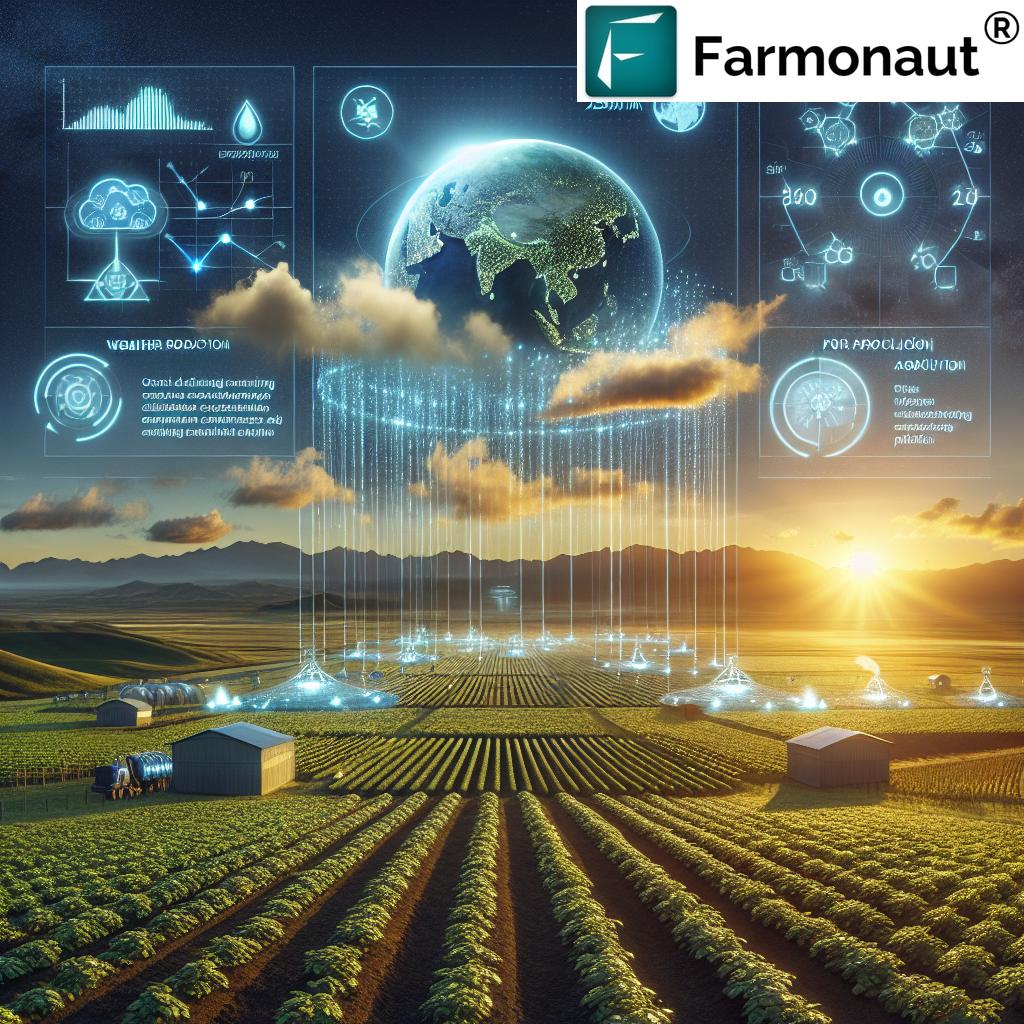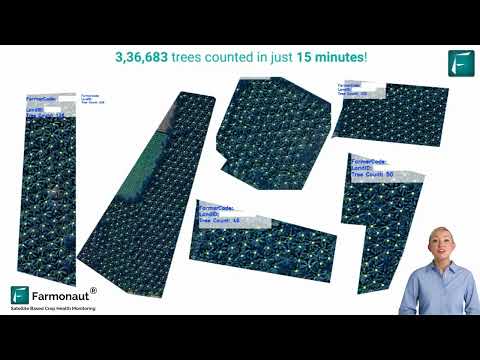Revolutionizing UAE Agriculture: AI-Powered Climate Innovations for Sustainable Food Systems at COP29
“AgriLLM, an AI-powered tool introduced at COP29, aims to revolutionize agricultural extension services for millions of farmers globally.”
As we delve into the groundbreaking developments unveiled at the 29th Conference of the Parties of the UNFCCC (COP29) in Baku, Azerbaijan, we’re witnessing a pivotal moment in the evolution of global agriculture. The spotlight on agricultural innovation for climate change has never been brighter, with artificial intelligence (AI) taking center stage in shaping the future of sustainable food systems.
In this comprehensive exploration, we’ll uncover how the UAE is spearheading transformative initiatives that promise to revolutionize farming practices, enhance food security, and combat climate change through cutting-edge technology and international cooperation.
The UAE’s Vision for Agricultural Innovation
At the heart of COP29’s agricultural focus was Her Excellency Mariam Almheiri, the UAE’s Head of International Affairs at the Presidential Court. Her presence at the conference underscored the UAE’s commitment to driving global progress in sustainable agriculture. Building on the momentum from COP28, where a groundbreaking partnership between the UAE and the Bill & Melinda Gates Foundation was announced, COP29 served as a platform to showcase the remarkable strides made in agricultural innovation over the past year.

Throughout the conference, a series of events highlighted the progress and potential of AI in agriculture, sustainable food systems, and climate-smart farming practices. Let’s dive into the key innovations and initiatives that are set to transform the agricultural landscape.
AgriLLM: AI-Powered Agricultural Extension Services
One of the most exciting announcements at COP29 was the introduction of AgriLLM, a revolutionary AI-powered tool designed to enhance agricultural extension services worldwide. This innovative project aims to support farmers and extension workers by providing access to digital tools powered by regenerative AI, particularly large language models.
AgriLLM represents a significant leap forward in democratizing access to agricultural knowledge and expertise. By leveraging the power of AI and natural language processing, this tool has the potential to:
- Provide farmers with instant, personalized advice on crop management
- Offer real-time solutions to pest and disease challenges
- Deliver localized recommendations for climate adaptation strategies
- Enhance the efficiency and reach of agricultural extension services
The implementation of AgriLLM aligns perfectly with the global push for digital transformation in agriculture, making it easier for smallholder farmers to access critical information and improve their productivity in the face of climate challenges.
AI-Powered Weather Forecasting for Climate Resilience
“COP29 showcased advancements in AI-driven weather forecasting, potentially benefiting over 500 million smallholder farmers worldwide with climate adaptation tools.”
Another groundbreaking initiative unveiled at COP29 was the AI-based Weather Forecasting Research and Training Program. This collaborative effort, involving the UAE, MBZUAI, and international technical partners, aims to revolutionize weather forecasting using artificial intelligence.
The program’s objectives include:
- Developing new AI-driven methodologies for more accurate and localized weather predictions
- Training over 30 country partners in advanced weather forecasting techniques over the next three years
- Mobilizing resources and technology to enhance climate readiness in agricultural sectors globally
This initiative is particularly crucial for smallholder farmers, who are often the most vulnerable to climate change impacts. By providing timely and accurate weather forecasts, farmers can make informed decisions about planting, irrigation, and harvesting, ultimately increasing their resilience to climate variability.
Empowering Farmers with Digital Tools
The Agricultural Innovation Mechanism for Scale (AIM for Scale), introduced at COP28, took center stage at COP29 with its focus on empowering small-scale producers through farmer-centered weather information. This initiative recognizes the critical need for accessible digital tools that can help smallholder farmers adapt to climate challenges.
Key aspects of AIM for Scale include:
- Developing user-friendly mobile applications for weather monitoring and forecasting
- Creating localized advisory services based on AI-driven climate predictions
- Facilitating knowledge sharing and best practices among farming communities
- Integrating IoT devices for real-time field monitoring and data collection
By putting these digital tools in the hands of farmers, AIM for Scale is fostering a new era of climate-smart agriculture that is both sustainable and productive.
Regenerative Agriculture Technology: A Game-Changer for Sustainability
COP29 also highlighted the growing importance of regenerative agriculture technology in achieving food security and climate action goals. This approach focuses on restoring soil health, enhancing biodiversity, and improving ecosystem services while maintaining productive agricultural systems.
Innovative technologies showcased at the conference included:
- AI-powered soil health monitoring systems
- Precision agriculture tools for optimized resource use
- Blockchain-based traceability solutions for sustainable supply chains
- Biochar and other carbon sequestration technologies for soil enhancement
These advancements in regenerative agriculture technology are paving the way for a more sustainable and resilient food system that can withstand the challenges posed by climate change.

Global Partnerships for Agricultural Innovation
The events at COP29 underscored the critical importance of international collaboration in driving agricultural innovation. The UAE’s partnership with the Bill & Melinda Gates Foundation serves as a prime example of how global cooperation can accelerate progress in sustainable agriculture.
Key aspects of this partnership include:
- Joint research and development initiatives for climate-resilient crop varieties
- Funding for innovative agri-tech startups focusing on sustainability
- Knowledge exchange programs between developed and developing nations
- Capacity building for agricultural researchers and extension workers
These collaborative efforts are essential for scaling up innovations and ensuring that the benefits of agricultural technology reach farmers across the globe, particularly in vulnerable regions.
The Role of AI in Transforming Global Food Systems
Artificial intelligence is emerging as a powerful force in reshaping the future of agriculture and food systems. At COP29, various presentations and discussions highlighted how AI is being leveraged to address some of the most pressing challenges in global agriculture.
Key applications of AI in agriculture include:
- Predictive analytics for crop yield optimization
- Automated pest and disease detection systems
- Smart irrigation systems for water conservation
- AI-driven supply chain management for reduced food waste
- Precision livestock farming for improved animal welfare and productivity
These AI-powered solutions are not only increasing agricultural productivity but also contributing to more sustainable and resilient food systems that can adapt to changing climate conditions.
Climate-Smart Farming Practices: A Cornerstone of Food Security
Climate-smart farming practices were a central theme at COP29, reflecting the urgent need to adapt agricultural systems to the realities of climate change while also mitigating its impacts. These practices combine traditional knowledge with modern technology to create more resilient and sustainable farming systems.
Examples of climate-smart farming practices highlighted at the conference include:
- Conservation agriculture techniques for soil health improvement
- Agroforestry systems for enhanced carbon sequestration
- Drought-resistant crop varieties developed through AI-assisted breeding
- Integrated pest management strategies using biological control agents
- Water-efficient irrigation systems guided by AI and IoT sensors
By adopting these practices, farmers can not only increase their resilience to climate shocks but also contribute to global efforts in reducing greenhouse gas emissions from agriculture.
The Future Food Systems Technical Assistance Program
As COP29 drew to a close, Her Excellency Mariam Almheiri unveiled plans for a Future Food Systems technical assistance program. This initiative aims to provide analytical resources and support to 15 nations committed to the UAE Declaration of Resilient Food Systems and Climate Action.
The program’s objectives include:
- Assisting countries in developing comprehensive food system transformation strategies
- Providing technical expertise for implementing climate-smart agricultural policies
- Facilitating access to innovative technologies and best practices
- Supporting the integration of food systems into national climate action plans
This program represents a significant step towards translating the commitments made at COP28 and COP29 into tangible actions that can drive sustainable change in global food systems.
AI-Powered Agricultural Innovations Comparison
| Innovation Name | Primary Function | Target Users | Climate Challenge Addressed | Estimated Impact on Crop Yield (%) | Estimated Reduction in Resource Usage (%) | Implementation Timeline |
|---|---|---|---|---|---|---|
| AgriLLM | AI-powered agricultural extension services | Smallholder farmers, Extension workers | Knowledge gaps, Low productivity | 15-25 | 20-30 | 2024-2026 |
| AI Weather Forecasting | Precise weather predictions for agriculture | All farmers, Agricultural planners | Climate variability, Extreme weather events | 10-20 | 15-25 | 2024-2027 |
| AIM for Scale Digital Tools | Farmer-centered weather information delivery | Small-scale producers | Limited access to climate information | 8-15 | 10-20 | 2024-2025 |
| Regenerative Agriculture AI | Soil health monitoring and management | All farmers, Agronomists | Soil degradation, Carbon emissions | 20-30 | 25-35 | 2024-2028 |
| AI-Driven Precision Farming | Resource optimization in crop production | Medium to large-scale farmers | Resource inefficiency, Environmental impact | 25-40 | 30-50 | 2024-2026 |
This table provides a clear overview of the various AI-powered agricultural innovations discussed at COP29, highlighting their potential impact on crop yields, resource efficiency, and implementation timelines. It demonstrates the diverse range of solutions being developed to address climate challenges in agriculture and underscores the transformative potential of AI in creating more sustainable and resilient food systems.
The Role of Satellite Technology in Modern Agriculture
While AI is at the forefront of agricultural innovation, satellite technology plays a crucial role in providing the data necessary for many of these AI-powered solutions. Companies like Farmonaut are at the cutting edge of this technology, offering satellite-based farm management solutions that complement and enhance AI-driven agricultural innovations.
Satellite technology in agriculture offers several key benefits:
- Real-time crop health monitoring through multispectral imaging
- Large-scale land use mapping and analysis
- Precise weather forecasting for localized areas
- Soil moisture monitoring for optimized irrigation
- Early detection of pest and disease outbreaks
By integrating satellite data with AI algorithms, farmers and agricultural professionals can gain unprecedented insights into their fields, enabling more informed decision-making and sustainable resource management.
Accessing Advanced Agricultural Technologies
For farmers and agricultural professionals looking to leverage these cutting-edge technologies, there are several platforms and tools available. Farmonaut offers a comprehensive suite of satellite-based farm management solutions accessible through various platforms:
- Web Application for desktop access
- Android App for on-the-go field management
- iOS App for Apple device users
- API access for developers and businesses looking to integrate satellite data into their own systems
These tools provide farmers with valuable insights into crop health, weather patterns, and resource management, aligning perfectly with the goals of sustainable and climate-smart agriculture discussed at COP29.
FAQs
- Q: How does AI contribute to sustainable agriculture?
A: AI contributes to sustainable agriculture by optimizing resource use, improving crop yield predictions, enhancing pest and disease management, and providing personalized recommendations for climate-smart farming practices. - Q: What is the role of satellite technology in modern farming?
A: Satellite technology provides real-time data on crop health, weather patterns, and land use, enabling farmers to make informed decisions about irrigation, fertilization, and pest control, ultimately leading to more efficient and sustainable farming practices. - Q: How can smallholder farmers benefit from agricultural innovations like AgriLLM?
A: AgriLLM and similar innovations provide smallholder farmers with access to expert agricultural knowledge and personalized advice, helping them improve their farming practices, adapt to climate challenges, and increase their productivity and income. - Q: What are climate-smart farming practices?
A: Climate-smart farming practices are agricultural techniques that increase productivity while adapting to and mitigating climate change. These include conservation agriculture, agroforestry, water-efficient irrigation, and the use of drought-resistant crop varieties. - Q: How does the UAE’s Future Food Systems technical assistance program support global agriculture?
A: The program provides analytical resources and support to nations committed to transforming their food systems, helping them develop and implement climate-smart agricultural policies and integrate innovative technologies into their farming practices.
Conclusion: A New Era of Sustainable Agriculture
The innovations and initiatives showcased at COP29 in Baku, Azerbaijan, mark a significant milestone in the global journey towards sustainable and climate-resilient agriculture. From AI-powered tools like AgriLLM to advanced weather forecasting systems and regenerative agriculture technologies, we are witnessing a transformation in how we approach food production and environmental stewardship.
The UAE’s leadership in driving these innovations, coupled with strong international partnerships, sets a powerful example for global cooperation in addressing the challenges of climate change and food security. As we move forward, the integration of AI, satellite technology, and climate-smart practices will be crucial in creating a more sustainable and resilient global food system.
For farmers, agricultural professionals, and policymakers alike, embracing these technological advancements and sustainable practices is not just an option but a necessity. By leveraging tools like those offered by Farmonaut and adopting the innovations discussed at COP29, we can work towards a future where agriculture not only feeds the world but also plays a vital role in mitigating climate change and preserving our planet for future generations.
As we conclude this exploration of the groundbreaking developments from COP29, it’s clear that the future of agriculture is bright, innovative, and deeply intertwined with the latest advancements in AI and satellite technology. The journey towards sustainable food systems is well underway, and with continued collaboration and innovation, we can create a more resilient and prosperous agricultural sector for all.






